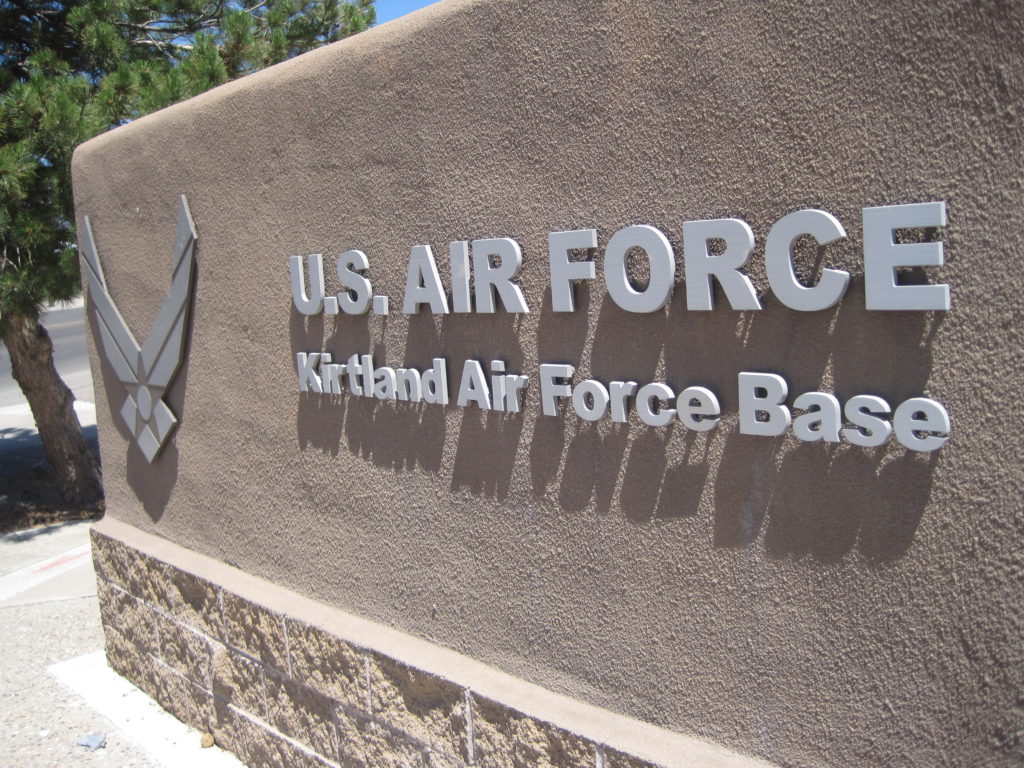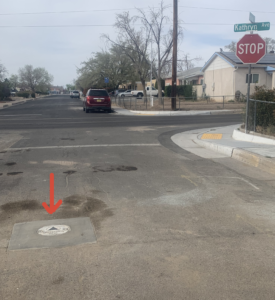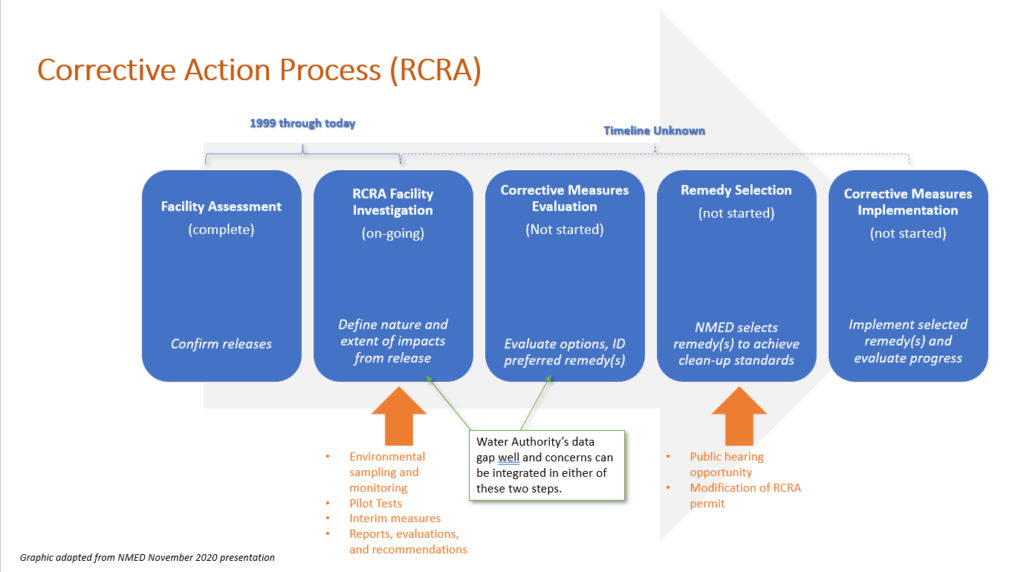Addressing the jet fuel leak at Kirtland Air Force Base
The Water Authority works in cooperation with the United States Air Force, the New Mexico Environment Department (NMED), and our partner agencies (City of Albuquerque and Bernalillo County) to monitor the decades-old jet fuel leak that has contaminated groundwater beneath Kirtland Air Force Base and nearby neighborhoods. The leak site is a source-water protection priority for the Water Authority because of its proximity to drinking water supply wells. Fortunately, no drinking water wells have yet been affected by the leak.
The Water Authority voluntarily monitors groundwater near the leak site for several contaminants, including ethylene dibromide (EDB). The utility and its contractors also conduct regular reviews of publicly available NMED and Air Force records to monitor any migration of contamination toward down-gradient supply wells. This data is also used in developing conceptual models of the site by both the Water Authority and the Air Force. Such models integrate information on what contamination is present, where it can be found, and how it may (or may not) migrate through soil and water.
The fuel leak cleanup project is regulated by NMED under the federal Resource Conservation and Recovery Act (RCRA), which specifies a step-by-step Corrective Action Process for remediation of the spill by the Air Force (see graphic below).
The Water Authority’s Data Gap Groundwater Monitoring Well Project
UPDATE, APRIL 19, 2022–We are happy to announce that the installation of the Water Authority’s Data Gap Groundwater Monitoring Well is now complete. As of April 14, 2022, the drilling site located near Indiana St. and Kathryn Ave. has been cleared of all equipment and debris, leaving only the new well and its manhole cover in the street (see picture). We greatly appreciate the patience and cooperation of the neighborhood residents during the drilling process.
Overview
Water Authority staff and contractor reviews of the Air Force’s site characterization reports have identified a persistent data gap, or blind spot, regarding the extent of EDB migration toward Water Authority well fields to the north/northeast of the spill site (particularly at depth, well below the top of the water table). Because the Air Force has declined to install a monitoring well capable of filling this data gap, the Water Authority sought and received State capital outlay funds to do so on its own. Once completed, this project will significantly increase the utility’s ability to ensure the safety of nearby drinking water supply wells.
Project Points of Contact:
Diane Agnew, Water Rights Program Manager: dagnew@abcwua.org (505) 289-3004
Rachel Stone, Community Relations: rstone@abcwua.org (505) 289-3071
Project Schedule:
Start of drilling: Jan. 24, 2022
Well construction and development: Feb. 18, 2022-April 12, 2022
Site restoration: April 13, 2022 (see pictures of restored site here).
Well Sampling Event No. 1–
Completed May 2022
Well Sampling Event No. 2–
Completed August 2022
Slug testing–
Completed June 2022
Project Documents:
INTERA Technical Memo on Well Location
Final Work Plan/Sampling & Analysis Plan
Project Management Plan (FINAL)
Health & Safety Plan (FINAL)
NMED Letter of Approval for Work Plan/Sampling and Analysis Plan
Final Well Design: Construction Diagram and Boring Log with Geophysics
NMED Letter of Approval for Final Well Design
Final Data Gap Monitoring Well Installation Report
Appendices to Well Installation Report (A to B part 1)
Appendices to Well Installation Report (B part 2)
Appendices to Well Installation Report (B part 3)
Appendices to Well Installation Report (C to E)
Appendices to Well Installation Report (F to K)
Sampling Results
Samples Collected During Drilling
Push-ahead groundwater sampling will be conducted during drilling process at up to five depths, and an additional groundwater sample will be collected at the water table using a bailer. The purpose of this sampling is to obtain information about concentrations of EDB in groundwater during the drilling process within the “data gap” interval. The samples will be analyzed with results reported to the Water Authority within approximately 24 hours from when the lab receives the sample for the presence of EDB and the results used to inform the selection of the final well screened interval.
| Date of Sample | Depth of Sample (feet below ground surface) | Analytical Method (see Table 2 of the Work Plan) | Analyte | Result (µg/L) |
| 2/10/2022 | 458.0 – 467.0 | 8011/504.1 | EDB | Non-Detect |
| 2/11/2022 | 486.5 – 488.0 | 8011/504.1 | EDB | Non – Detect |
| 2/15/2022 | 516.5 – 518.0 | 8011/504.1 | EDB | Non – Detect |
| 2/28/2022 | 582.0 – 583.5 | 8011/504.1 | EDB | Non – Detect |
| 2/15/2022 | 601.0 – 602.0 | 8011/504.1 | EDB | Non – Detect |
Ongoing Monitoring of Completed Data Gap Well
The Data Gap Well is sampled using two methods: (1) passive sampling using passive diffusion bag (PDB) samplers (for volatile organic compound [VOC] constituents) and dual membrane passive diffusion samplers (DMS) (for non-VOC constituents), and (2) a combination of low-flow sampling and purging three saturated well-casing volumes using a dedicated Bennett Pump.
| Data Gap Well Installation | |||
| Sampling Event | EDB Result | Report Text | |
| Passive Method | Active Method | ||
| Event 1 (May 2022) | ND | ND | Data Gap Well Completion Report |
| Event 2 (August 2022) | ND | ND | |
| Quarterly Data Gap Well Monitoring | |||
| Q4 2022 | Not Sampled | ND | Q4 2022 Report |
| Q1 2023 | ND | ND | Q1 2023 Report |
| Q2 2023 | ND | ND | Q2 2023 Report |
| Q3 2023 | ND | ND | Q3 2023 Report |
| Q4 2023 | ND | ND | Q4 2023 Report |
| Q1 2024 | ND | ND | Q1 2024 Report |
| Q2 2024 | ND | ND | Q2 2024 Report |
ND = Not detected above method detection limit
Frequently Asked Questions:
Link to Frequently Asked Questions
Correspondence:
| Date | Description |
| Water Authority Letters | |
| August 13, 2021 | Letter from the Water Authority to NMED regarding Air Force’s request to cease groundwater modeling of pump and treat performance |
| March 9, 2021 | Letter from the Water Authority Board to Governor Michelle Lujan Grisham |
| November 26, 2020 | Letter from the Water Authority Executive Director to AFCEC regarding Air Force’s request for comment on forming a Restoration Advisory Board (RAB) |
| June 26, 2019 | Follow-up Questions Regarding the April 17, 2019 Air Force Project Update on the Kirtland Air Force Base Bulk Fuels Facility Jet Fuel Leak |
| Water Authority Technical Memos | |
| November 19, 2020 | Analysis of Groundwater Monitoring with Passive Diffusion Samplers |
| January 14, 2020 | Kirtland Air Force Base Source Area Characterization Report for the Bulk Fuels Facility |
| July 19, 2019 | Kirtland Air Force Base Bulk Fuels Facility Vapor Intrusion Data Gap |
| November 2, 2018 | Kirtland Air Force Base Bulk Fuels Facility Numerical Flow Model |
Additional Resources:
Both KAFB and the NMED maintain online administrative records for the BFF project where additional documents and letters can be found:
KAFB Bulk Fuels Facility Project Website


